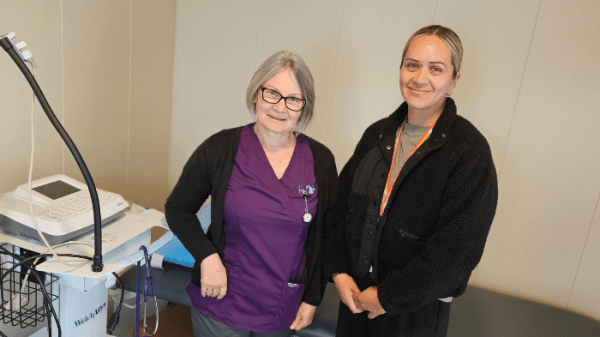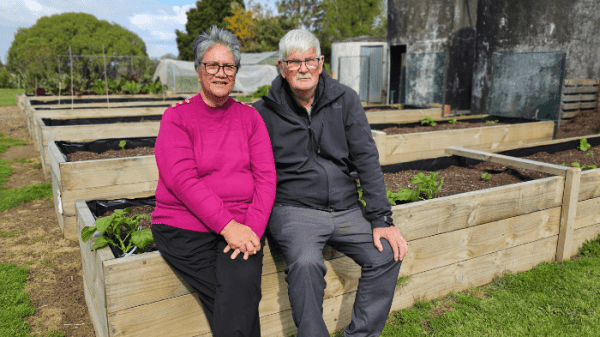Partnerships behind pā clinic’s success
Mangatoatoa Pā co-chairs Hone Hughes, left, and Derek Roberts – outside the old and new wharenui, not only share marae duties, such as mowing the lawn, but a vision for the health of the community.
The success of a marae-based health clinic at Mangatoatoa Pā, just inside the King Country boundary near the banks of the Pūniu River, shows the power of collaboration.
And if you are looking for visual proof, the makeshift waiting room, outside the three consultation portacoms, with its ‘always on the boil’ water urn, Tevo outdoor heater, snacks and health professionals readily at hand, provides that.
Marae committee co-chair Derek Roberts describes the past two years setting up and then maintaining the clinic as hectic – with support from Te Awamutu Medical Centre, Pinnacle and Tainui essential to its success.
“They’ve maintained the interest right from day one. By working in partnership, you can make that vision happen.
“Pinnacle have been the enablers. They’ve enabled us to do what we want to do for our whānau,” he says.
The Wednesday we visit, both clinical care co-ordinators – Jenny Sutton from Mahoe Medical and Whitney Te Wano from Te Awamutu Medical – are on hand as is Mahoe GP Shivam Deo. When the clinic first started in 2022, it was held fortnightly but last year Mahoe came on board, and it became weekly.

Clinical care co-ordinators – Jenny Sutton, left, from Mahoe Medical and Whitney Te Wano from Te Awamutu Medical.
The marae is only nine kilometres from Te Awamutu on Te Mawhai Road, off SH3. Its primary hapū are Parewaeono, Ngutu and Paretekawa of Ngāti Maniapoto. A portrait of Rewi Maniapoto – a prominent supporter of the Māori King movement in the 1850s and who is buried in nearby Kihikihi - hangs in the wharenui Te Maru o Ihowa, built 10 years ago next to Te Aroha o Ihoa, the original 1908 wharenui.
Te Awamutu Medical Centre general manager Wayne Lim says providing free community health services for Māori away from the practice and in marae had always appealed to him as a model that would work.
The marae committee was keen and with some assistance from Raukawa Charitable Trust, Te Awamutu Medical Centre funded a three-month trial that established the service at Mangatoatoa Pā. The initiative kicked up a gear in October 2022 when Waikato-Tainui and Pinnacle saw for themselves how the Te Whare Tapa Whā centric model of care - that encompasses both western and traditional Māori practices – was working.
Both committed funds to keep it going – Tainui money for the facilities and patient procedures, Pinnacle for the cost of clinical delivery.
Mahoe came on board in January this year and the clinic’s free services have been fully subscribed every week since providing GP, diabetes nurse and pharmacist consults, cervical screening and prescriptions.
Roberts hopes they will soon be able to add immunisations for tamariki.
“Word is spreading across the affiliated network and as the clinic becomes more popular the nurses and GPs have been receiving an increasing number of drop-in patients as well as the patients who have made scheduled appointments,” says Lim.
Pūniu River Care – an iwi-connected environmental restoration organisation – has its nursery next door and the workers there can access medical care conveniently.
The nursery approached the marae several years ago wanting some money for their first irrigation and has since grown into what it is today, says Roberts.
Another funding boost from Tainui has resulted in wooden planters being installed to grow vegetables for visitors and patients.

Moe and Derek Roberts with the raised vegetable gardens created from timber gifted to the marae by Waikato Tainui.
Some whānau had stopped going to the GPs in Te Awamutu because they owed money. The funding helped pay off those debts so they could access specialist help and speed up clinical investigations.
“It fits in with Tainui’s health and wellbeing strategy,” says Roberts.
Te Wano is on a fixed term contract as part of Pinnacle’s comprehensive and community team and will be active at the clinic and around the region.
The team provides enhanced interdisciplinary primary care with a focus on improving equity of access to care and health outcomes for Māori, Pacific people, disabled and people living in rural and highly deprived areas.
Her role is to help coordination of care as part of the comprehensive primary and community team for people and whānau with the greatest complexity of care needs.
Te Wano is a familiar face for many – she was previously a public health nurse, and her mother Tania is charge nurse manager at Te Kūiti Hospital.
The community team has also backfilled a clinical pharmacist position allowing Rachel Bell to spend more time supporting the marae clinic.
Other partnerships include Rongoaa Tuku Iho Healing, Selina Paerata a health improvement practitioner from Kokiri Trust, Diana Johnson - clinical psychologist Te Amohia Health (Quit Smoking), Ko Wai Au (Rangatahi Service), Maori Women’s Welfare League and Kaianga Aroha.
The initiative is quite broad and includes medical visits, bowel screening, mental health assistance, dance and movement sessions and health food preparation workshops to ensure whānau have a holistic hauora experience.
The programmes aim to promote overall wellbeing and to empower the hāpori (community).
The clinic has attracted attention from researchers who have secured a grant from the Health Research Council NZ to look at how the healthcare delivery has made a difference in the lives of whānau and hapū.
“Many marae struggle to create ongoing engagement outside of tangihanga, therefore, there are multiple benefits to this research project,” says lead researcher Awanui Te Huia.
Another successful partnership is at the marae itself where Roberts, a pākehā, works closely with kaumatua and marae co-chair Hone Hughes. They love nothing better than hopping on the marae’s ride-on mowers to care for the pā’s spacious grounds.
There is a family connection – Roberts’ wife Moe is Hughes’ cousin.
Roberts met his wife to be in 1972 after moving from Australia and trained as a psychiatric nurse at the now-closed nearby Tokanui Hospital. He returned to Australia for a five year stint from 2005 developing mental health services based in the country music capital of Tamworth in New South Wales.
Back in Aotearoa New Zealand, he worked for Hauora Waikato Kaupapa Māori Mental Health Service up until his retirement in 2018. Since then, he has devoted time at the marae where he jokes they will have to carry him out in a wooden box.
“There’s been a lot of interest in this marae-based programme,” he says.
In the first three months of this year, the clinic saw 77 patients, 14 of them for the first time. The next quarter there were more than 120 patients seen, some by a doctor but most by a nurse.
Mangatoatoa Marae also hosts a monthly legal clinic in partnership with Community Law Waikato for employment issues, tenancy, judicial matters, power of attorney and wills.
This service provides whānau with the opportunity to navigate legal challenges and feel empowered in dealing with a broad range of issues.